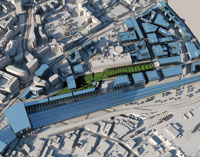The year 2026 seems a long way off, but in the world of development and regeneration it is nearly upon us. This is the year in which the first high-speed rail service will run between Birmingham and London and though we are over a decade away, now is the perfect time to be putting in place the foundations to maximise the economic opportunities created by HS2.
The launch of the Birmingham Curzon masterplan in February was a defining moment for the city, signalling our ambitions for HS2. The catalytic effect of a terminus station in the heart of the city centre should not be underestimated.
The masterplan is the basis for everything that follows on our journey to realising the economic potential of HS2. The creation of the Birmingham Curzon Regeneration Company, announced on 21 July, adds further momentum. Tasked with overseeing the delivery of the station and maximising the regeneration impact in the surrounding area, the company is pivotal to what we want to achieve. The early conversations about creating an urban development corporation quickly passed as we focused our attention on what was really needed at a local level.
So a partnership has been formed that will combine the funding, expertise and statutory powers of local and national organisations, including Birmingham city council, Greater Birmingham and Solihull LEP, Centro, the government and HS2 Ltd. It is a local approach to delivering growth and one that I am very excited about.
But we still need to shape how the opportunities created by HS2 can be unlocked. This is where our growth strategy for Birmingham Curzon comes in. The strategy, set to be published in March 2015, will set out the development programme, infrastructure phasing and funding mechanisms for the area. It will be about combining the delivery of big-ticket items with fostering business development and fine-grain improvements.
£1bn of infrastructure
Birmingham’s recent experience demonstrates that if you get the infrastructure right and create attractive places, you can create the conditions for growth. More than £1bn of infrastructure investment is under way in the city, including the redevelopment of New Street Station, a Metro extension and airport expansion. When you add in the investment in HS2, the opportunity to stimulate growth is immense.
In a globally competitive environment, having the best quality infrastructure and connections is vital. From a national perspective, this is why the HS2 line cannot stop at Birmingham and must be delivered rapidly north to Manchester and beyond. The benefits for the UK need to be fully realised and the national network is a fantastic opportunity to strengthen regional cities and their international competitiveness.
Ultimately, investments in infrastructure need to translate into new businesses and jobs. The announcement that the HS2 construction HQ will be in Birmingham city centre is a major boost for the city. The result is 1,500 jobs covering engineers, designers and other technical support.
Shift in sentiment
This announcement signals a shift in thinking about regional centres as locations for central functions. We want to create a cluster of HS2-related activity in the city centre and are already seeing a shift in sentiment about office-led developments which, with the HQ announcement, is boosting the city’s credentials as a location to invest and grow a business.
Since the announcement we have been inundated with interest from a range of companies looking to establish in Birmingham.
These major inward investments are hugely positive, but it is also about how we foster new businesses, supporting start-ups and existing enterprises. These companies will become the next major employers and contributors to the economy. We need to grasp the strengths that the city has and promote this to the maximum.
In the end, this is all about rebalancing the UK economy and strengthening UK plc. We are at the start of a very exciting journey and Birmingham is perfectly placed to lead the way.
Waheed Nazir is director of planning and regeneration at Birmingham city council











